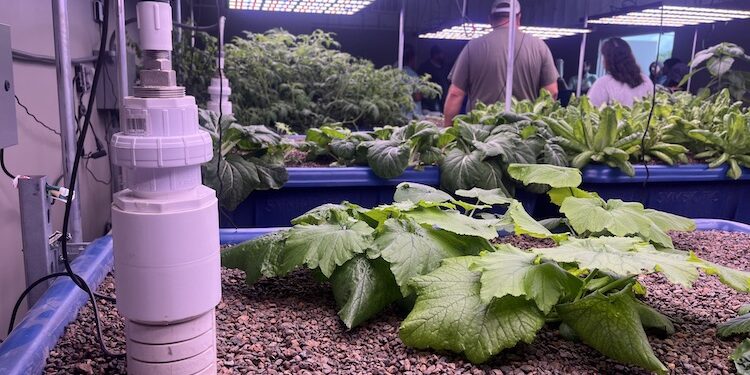MORRIS, Okla. – The Muscogee (Creek) Nation Conservation District hosted a two-day aquaponics training event at the Morris Indian Community Center July 20-21.
Symbiotic Aquaponics, LLC CEO Kaben Smallwood (Choctaw) provided the training with a presentation on the first day and hands-on training the following day.
Smallwood’s presentation included the basic information in addition to sharing his knowledge and skill with participants including maneuvers to capitalize upon aquaponic farming.
Citizens may utilize an array of funding sources including USDA, FSA, or the Mvskoke Fund for ag-business start ups. Landowners may have the potential to capitalize in various ways.
Using Native American Agricultural Funds as a resource, MCN Conservation is seeking ways to promote this type of industry to Native Americans and promote food sovereignty.
Smallwood’s passion for aquaponics is something he hopes tribal members will adopt as a way to practice sovereignty in the food industry.
“If you can’t feed yourself, you don’t have sovereignty,” Smallwood said.
He believes the tribes should redirect the focus on services to their citizens in the long-term view. Simple diet changes could save millions in healthcare costs in the future.
“One ounce of prevention is worth a pound of cure, ” Smallwood said.
He claims to see the health disparities by using food as another way to destroy tribes.
“We have always had to take what we have been given,” Smallwood said. “Now that tribes are in the position to do better, they should.”
The MIC houses an aquaponic grow system behind the building in a small barn.
The group followed Smallwood to the barn where he could show the participants all the needed components and how they work together to create a clean, environmentally safe garden.
There are several pieces to the system that can be purchased using start-up grants and business funds. A part of Smallwoods’ business is setting these systems up for those who purchase equipment from him.
On the website, the smallest unit starts at around $2,600 and goes up from there, depending on the desired size of the garden.
Once the setup is complete Smallwood claims the labor is minimal, however oversight is important.
“The industry needs skilled and knowledgeable workers,” Smallwood said of the aquaponics and agricultural industry.
Even with loans, most businesses default within two to three years, Smallwood estimated.
It is with these trainings that education can be provided to capitalize on opportunities by using natural abilities and land ownership or even obtainment, according to Smallwood.
Nutrient-based growing
Aquaponics is defined as the agricultural practice of growing plants and fish in a closed, recirculating system, according to Smallwood.
Smallwood calls it a microbiological process using the combination of both hydroponic and aquaculture methods that fosters the relationship between plants and fish.
Hydroponics is growing plants in sand, gravel, or liquid where the plants pull the needed nutrients from water that may be treated.
The treated water is in many cases considered toxic to animals and humans after it has cycled through the system, producing toxic wastewater.
Aquaculture is the rearing of aquatic animals or the cultivation of aquatic plants for food. This method of farming is used to raise and harvest water species using large tanks, confined pools and segregated bodies of water.
Without proper management, this type of farming can be damaging to the environment. It has also been known to become a toxic pool for the fish without adequate mitigation or removal.
In a thriving aquaponic system, sterilization is a natural process where the fish release ammonia that is converted into nitrates, then watered to the plants. The water from the plants is then collected in a large basin, before going back into the fish tank using a pump to distribute water.
Smallwood claims soil is not a necessary component for plant growth. In traditional agriculture using soil, more water is used and very little of it gets to the plants due to runoff, evaporation and soil absorption.
Ultimately, aquaponics is a natural and better combination of aquaculture and hydroponics that uses a recirculating water system to raise and harvest all natural plants and fish in a symbiotic environment.
For more information call the MCN Conservation at 918-549-2609, or visit https://www.symbioticaquaponic.com/ for more about Smallwood’s presentation.





